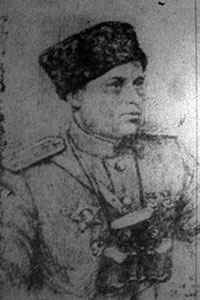Efim (Chaim) Popov was born in 1906 in Monastyrshchina, Ukraine. In 1927 he began serving in the Red Army, where he became a staff officer in the cavalry. Then Popov joined the Communist Party. He started engaging in battle on July 7, 1941 and commanded a regiment of Kuban Cossacks (this group of Cossacks who had lived in the western part of the North Caucasus since the end of the 18th century). In January 1943 in the area of Stalingrad his regiment carried out a 250 kilometer raid on the enemy rear that resulted in the surrounding of a large number of Germans, headed by three generals, and their capture. In October 1943 Popov's regiment was fighting west of Smolensk. This was an area where many Jews had lived and there were many shtetls there. This was where for the first time Red Army soldiers saw many mass graves of murdered Jews. The Yiddish journalist Moyni Shulman wrote about the activities of Popov's Cossacks in this area in his article "The Cossack Colonel Chaim Popov." This article reflected the ideological guidelines prevalent in the USSR during the war that were aimed at minimizing the Holocaust or sometimes even totally eliminating references to it. Noting that Popov's Cossacks fought successfully against the Germans, Shulman wrote: "The blood and pain of Russian, Belarusian, and Jewish civilian residents of Monastyrishche and Tatarsk, who were [all] murdered, buried alive in the ground – all of this was avenged." Further, Shulman stresses the multi-ethnic composition of Popov's regiment, in whose ranks units were commanded by a Kuban Cossack, a Tatar, and a member of the Tuvin ethnic group. Further Shulman concludes that these "three captains were led by the Jewish colonel Efim Popov." However, even these ideologically correct lines were cut from the article that was published in Eynikayt on October 19, 1944. Furthermore, except for his first name, Chaim, there was no other indication that the commander of the Cossacks was a Jew.
Of course, it was not a simple matter for a Jew to be the head of a regiment of Kuban Cossacks. The Cossacks had long been notorious for their anti-Jewish attitudes and there was good reason for the highly negatively place they had in Jewish historical memory. It was even more difficult for a person with the obviously Jewish patronymic of Abramovich to gain their confidence.
In 1944, when it traversed the Polessian swamps to reach Volyn, Popov's regiment staged a raid on the German rear in the area of Dubno and Równe, moved further into the Lublin area and, finally, via Transylvania entered Hungary, where it distinguished itself in the fighting for Debrecen. Popov was wounded three times during the war. He was awarded the Order of the Red Banner (twice), the Order of Lenin, the Order of Suvorov, 3rd class, and other military honors as well.







